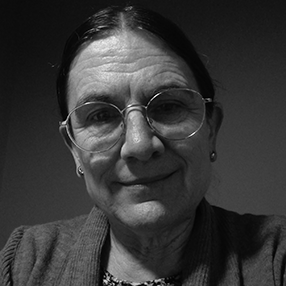These are times when judicial proceedings would do well to include a linguist, a forensic linguist...
—El País, Catalan Edition, 27 March 2018
A foreigner, I walk Barcelona breathless, marveling
at files of school children laughing, chatting as teachers
shepherd them in Catalan, at street signs in the same
language, at elderly men and elderly women on benches
or peering down from balconies, once shamed or worse
for speaking this, their heart language, gossiping now
in short words ending in plosives, in fricative zh´s
and sh´s not found in Spanish,
all in my lifetime, and I think how
language is fragile, how a breath
could leave a sentence and not return,
because this morning I scrolled down the news,
past the headlines of politicians imprisoned,
of the ex-president detained, no violence needed,
behind him the bloody wipe of fingers
on the gold shield that is the Catalan flag,
scrolled past the photos of multitudes in the streets,
on the highways, the students, the grandmothers,
the professionals, of baton-swinging police,
down to the bottom, to the story of the last
professor of Phoenician language in Spain.
She’s 67, has taught at the University of Barcelona
for 43 years, since Franco died. Phoenicians
settled the coast of Catalonia, wrote early pages
of the Catalan story, and when she retires,
their words will dissipate back out to sea.
An empty desk the final straw,
but where does the death of a language begin?
A law? A jail? A baton?
When I began Catalan, I didn’t know
learning a language is a political act.
How can I not be changed once I'm able to speak
of rauxa and seny, words of Catalan character,
no equivalent in the language of Cervantes,
of my Southern mother, my Midwestern father?
Maybe I had always been waiting
to hear these words, waiting since Casals´
cello sang Bach to me, waiting since, as a child,
Dali shocked me, The Persistence of Memory,
not knowing those golden cliffs were the coast
of Catalonia, not knowing the other language,
before art, before sonatas or oils, was Catalan.
Who is waiting today, waiting without knowing
they are waiting, to hear a word in Phoenician,
a word now lost forever, drifted back to sea?
Copyright © 2021 by Sandra Gustin. Originally published in Poem-a-Day on March 22, 2021, by the Academy of American Poets.
“I recently tried to count the number of places I’ve called home: there were at least twenty, not including one ship. Now I have a Catalan friend who has lived in the same house her whole life. I’m colossally indebted to those who generously share out of their treasure of roots, including language; I’m also indebted to W. S. Merwin for a line I used in the second stanza.”
—Sandra Gustin

